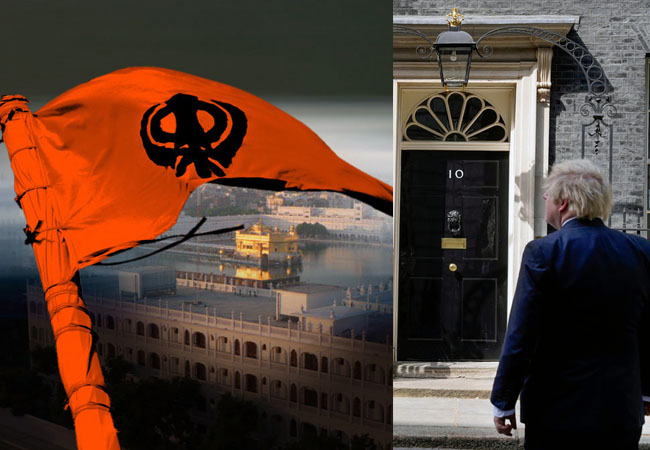London: On the 36th anniversary of the infamous Indian army attack on the Sikh nation’s spiritual and temporal seats of authority in Amritsar in June 1984, the World Sikh Parliament has written to the UK’s prime minister calling on him to take his Indian counterpart to task over the issue that has defined the Indo-Sikh conflict over recent decades – India’s unlawful denial of the right of self-determination in the Sikh homeland. The British government’s responsibilities as the former colonial power, the imperative of upholding international law and the need to disavow the foolish complicity of the then Thatcher government, provide sufficient reason to act, according to the global Sikh body.
In 2014 shocking revelations emerged from UK records showing that Margaret Thatcher had secretly sent military advisers to help plan the unforgivable assault on the heart of Sikh faith. Despite widespread condemnation of such an atrocious decision, believed to be inspired by vacuous Indian promises of economic favours, UK authorities continue to resist an independent enquiry in to the matter. Sooner or later, the full truth will need to emerge if UK authorities are to re-set relations with the UK’s 700,000 strong Sikh community.
The tragic events of June 1984, in which tens of thousands of Indian troops, backed by tanks, artillery and chemical weapons, levelled sacred buildings, martyred thousands of civilians and destroyed priceless historic artefacts, in the cowardly cause of majoritarian hegemony, forever shattered any possibility that India might reach any accommodation with the Sikhs over their long-pending demands. The genocidal policy of crushing a mass movement for more autonomy in Punjab was, at a stroke, transformed into a demand for a sovereign independent state. The Sikh nation formally declared independence when the Declaration of Khalistan was issued on 29 April 1986, mandated by a Sarbat Khalsa (national gathering) held on 26 January 1986 at the very same location as the 1984 carnage. The subsequent Sarbat Khalsa, held in Punjab in 2015 and attended by over 700,000 people, reaffirmed that historic decision. The conflict, which has cost over 200,000 lives remains unresolved as India continues to forcibly occupy Sikh territory and usurp Punjab’s riparian rights. It continues to incarcerate Sikh political prisoners, including a UK national, simply to deter others from pursuing the freedom struggle.
Pointing to the obvious parallels with the current use of massive force to suppress self determination in Kashmir, the letter calls on the UK to follow countries such as Germany, Holland and France as well as the UN itself which have objected to India’s formal ‘reservation’ against the right of self-determination, as set out in Article 1 of the 1966 Covenant on Civil and Political Rights – the bedrock of international human rights law. Incredibly, India purported to ‘opt out’ of that fundamental human right when it signed up the 1966 Covenant, claiming the right was not applicable to peoples or nations within territories it controlled. That patently unlawful position has led directly to catastrophic conflict in Punjab, Kashmir, Nagaland, Assam, Manipur and elsewhere – at the cost of untold human misery.
The World Sikh Parliament has welcomed recent moves by the international community to call out egregious human rights violations by an increasingly fascist Hindutva regime in India. Reports from the UN’s High Commissioner on Human Rights (on Kashmir and separately on India’s overtly discriminatory new citizenship law), the United States Commission on International Religious Freedom (on targeting of religious minorities) and statements from the UN’s Under Secretary General Adama Dieng (on weaponization of hate crime against minorities during the Covid-19 pandemic) are prominent in a welcome trend in exposing unlawful and unacceptable Indian government agendas and actions. The UK’s PM has now been urged to address the critically important issue of self-determination in that context. If Scotland’s right to decide its political destiny can be respected without a shot being fired, then surely peaceful conflict resolution, based on the same approach, to India’s intractable conflicts with freedom loving nations must be right as well.
The World Sikh Parliament’s UK chapter has also offered to work with ministers in the UK across a range of issues arising involving engagement with UK Sikhs, so as to help facilitate a proper interaction with a vibrant and forward-looking community. Recent mistakes, including a refusal to properly recognise Sikhs as an ethnic group for the purposes of relevant UK law and practice, have soured relations. The farcical inability of authorities to make a sensible appointment of a Sikh faith leader representative on its task force advising on opening places of worship from the Covid 19 lockdown was symptomatic of a disconnect that needs to be addressed.
Discourse with governments, the UN, other stateless nations and a variety NGOs, by the World Sikh Parliament since its formation following a Sarbat Khalsa gathering in Punjab in 2015, has sought to correct an anti-Sikh narrative that has been scripted by India and its mercenary army of apologists for many decades. As a global body, it has pledged faithfully represent the Sikh national interest and help restore the nation’s place on the world stage. This latest engagement with 10 Downing Street is an important step in that process.
